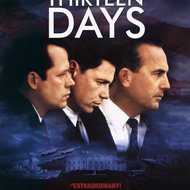Event Report
March 7, 2001
In order to stimulate discussion of past nuclear crises and current nuclear risks, the Global Security Institute hosted a screening of Thirteen Days, the critically acclaimed film about the Cuban Missile Crisis, on March 7 at the United Nations. Participants included over 225 ambassadors and mission representatives from dozens of countries and many NGO representatives.
Preceding and following the film, Jonathan Granoff of GSI hosted conversations with Ambassador Richard Butler (former head of the Iraq weapons inspection team), Theodore C. Sorensen (Special Adviser to President Kennedy during the Cuban Missile Crisis), Jayantha Dhanapala (U.N. Under-Secretary-General for Disarmament Affairs), and Peter Almond (producer of Thirteen Days). The panel was co-hosted by Lawyers Alliance for World Security and the American Bar Association.
Commenting that Thirteen Days was a remarkable historic reenactment which reminded generations of that critical time when we almost faced a nuclear holocaust, Ambassador Dhanapala voiced his concern that the theory of deterrence can be neither proved nor disproved, since a single failure of nuclear deterrence would be catastrophic.
“The only weapons of mass destruction that we have not de-legitimized are the nuclear weapons. This will take leadership on the part of the countries that have nuclear weapons. Civil society must take action to eliminate nuclear weapons, to strengthen the political will so we do not have to wait for another crisis or for another accidental nuclear war to realize their destructive potential. The international community can solve their problems through peaceful, political means rather than using weapons of war, which is a very uncivilized and barbaric way to settle problems, particularly in the 21st century.”
In the pre-screening interview, Ambassador Richard Butler noted that the nuclear danger has not gone away with the end of the Cold War: “The nuclear age began with two nuclear weapons, the two that the United States used over Japan. In the subsequent 30 years no less than 80,000 nuclear weapons were created and even though the Cold War is behind us, many of the strategic nuclear weapons are still on hair trigger alert status. It is a matter of minutes that a retaliatory launch of nuclear weapons may be authorized.”
After the screening, Mr. Sorensen recounted the climate, personalities, perceptions, fears and factors that contributed to the tensions and decisions made at that time. He emphasized the importance of having thirteen days to respond: “If we had been required to make an immediate response, we would have bombed those missiles. We now know that the local Soviet commanders in Cuba had full authority to use those tactical weapons if there was any attack on Cuba by the United States. We would have responded, almost surely, to a nuclear attack with a nuclear counter attack. We wouldn’t probably be sitting here talking about this movie tonight.”
“There are a great many lessons from those thirteen days that are relevant today. Most important is the quality of leadership, in the U.S. and in other countries. It is also important that adversaries keep lines of communication open, keep the dialogue going and try to find some way other than armed hostilities to solve critical situations.”
Mr. Sorensen emphasized the importance of multilateral organizations, such as the support given by the OAS and Allies in Europe, and stressed the critical role of the United Nations in providing a forum for patience and restraint.
In response to a question about the diplomatic implications of NMD, Mr. Sorensen said that national missile defense was a contradiction of terms. “What would be the real value, to say nothing of the consequences, of the United States having a true shield that somehow protected the United States but protected no one else in the world? It would destroy alliances of cooperation, confidence in our restraint and our willingness to share their pain. The word “defense” in that trio is a misnomer. No system has been invented which can provide an absolute defense. The offense would always get ahead of defense, no matter how thoroughly a defense was developed. The United States is relatively free from the threat of destruction today. But I am willing to wager that in a list of the 15 most likely means of a destructive attack upon the U.S., nuclear missiles, flying through space would rank number 15 at best.”
Ambassador Dhanapala and Jonathan Granoff discussed the feasibility and implications of the proposed defense shield. Ambassador Dhanapala remarked, “A missile defense program undermines the Anti Ballistic Missile treaty and opens a Pandora’s box to another arms race, at a time when 182 countries are seeking full compliance to the nuclear Non-Proliferation Treaty (NPT) which was also signed by the five nuclear powers.”
At the close of the evening, Jonathan Granoff reflected, “Hitler had to drag 6 million people to the ovens. We have now put wings on the ovens. As we speak those ovens are ready to deliver their horrific payload. Thirteen Days is a renewed wake-up call. The combination of human fallibility and technological prowess compels me to say it is time that we reign in these weapons through the constraints of morality, law, and human cooperation. I hope that all of you who watch the movie Thirteen Days will join us in working to achieve that goal.”
Jonathan Granoff is the President of the Global Security Institute, a representative to United Nations of the World Summits of Nobel Peace Laureates, a former Adjunct Professor of International Law at Widener University School of Law, and Senior Advisor to the Committee on National Security American Bar Association International Law Section.








